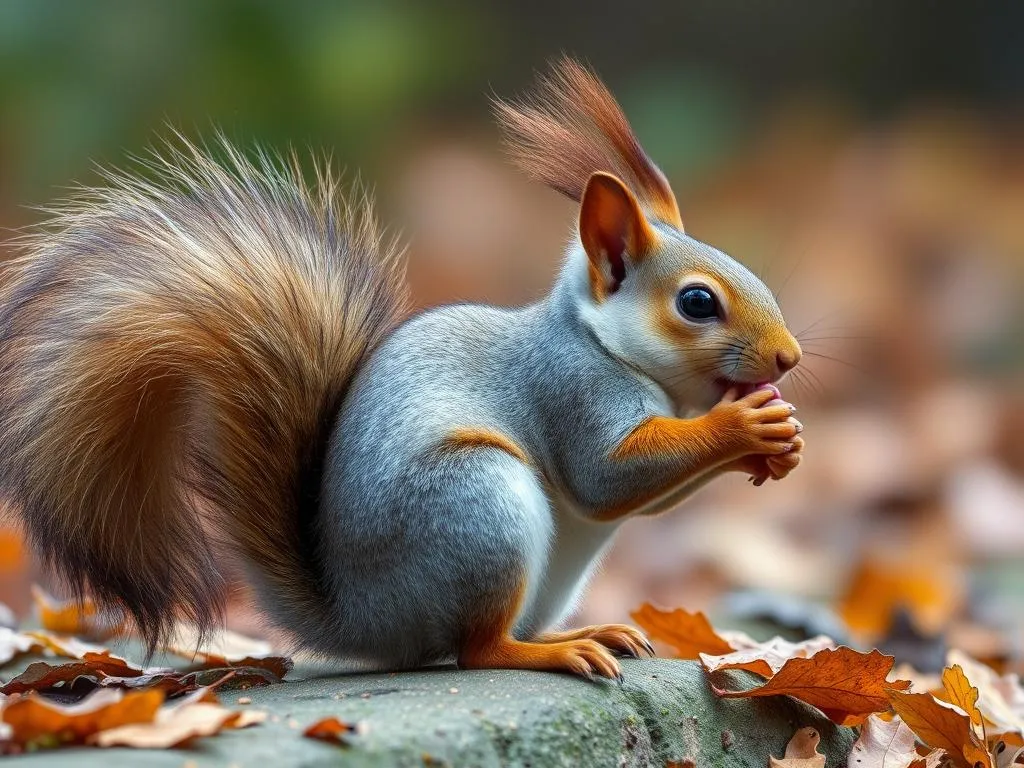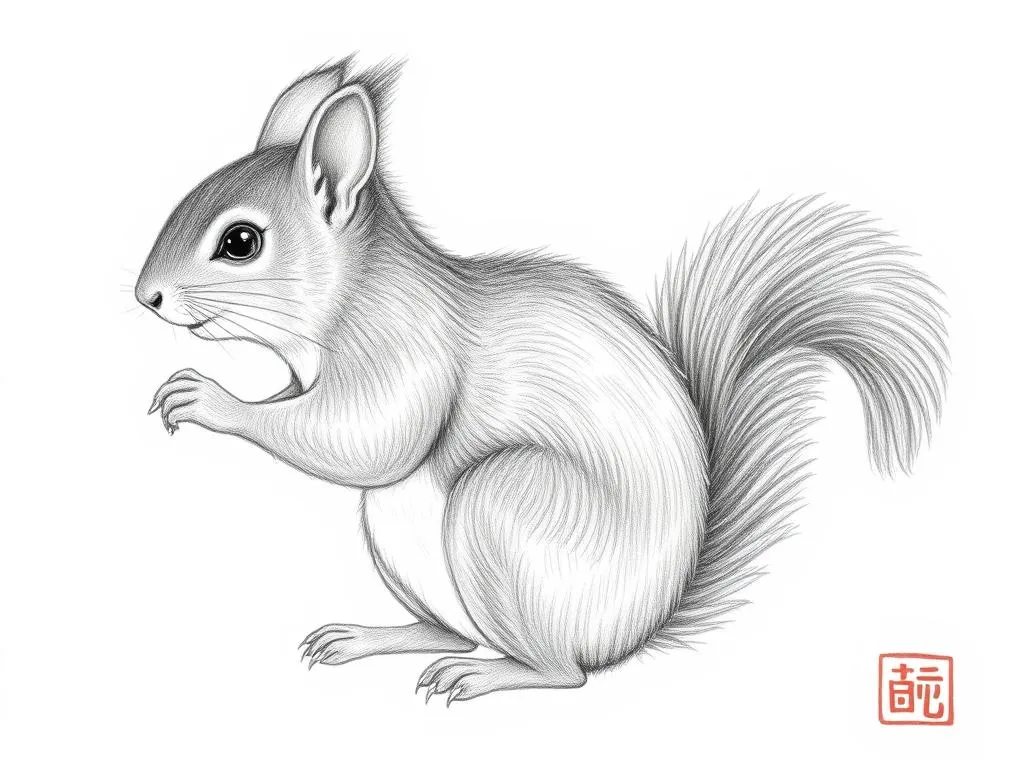The Enigmatic Japanese Squirrel: Symbolism and Significance

Disclaimer: Some images on this website are AI-generated artworks and may not accurately represent real animals.
The Japanese squirrel (Sciurus lis) holds a unique place in the natural world and in the cultural tapestry of Japan. Known for its agility and playful nature, this small creature embodies various symbolic meanings that resonate deeply within Japanese folklore and spirituality. In this comprehensive exploration, we will delve into the physical characteristics, behavioral traits, and the rich symbolism associated with the Japanese squirrel, uncovering its significance in dreams and modern interpretations.
Understanding the Japanese Squirrel
Species Overview
The Japanese squirrel is endemic to the islands of Honshu, Shikoku, and Kyushu in Japan. Preferring the lush, temperate forests, it thrives in environments rich in broadleaf trees. These squirrels have adapted to various habitats ranging from urban gardens to mountainous woodlands, showcasing their remarkable resilience and adaptability.
Physical Characteristics
The Japanese squirrel is a small mammal, easily recognizable by its distinct physical traits.
| Feature | Description |
|---|---|
| Fur Color | Chestnut brown with a lighter underside |
| Size | Approximately 20-25 cm in length |
| Tail | Long and bushy, often twice the body length |
| Ears | Rounded and tufted |
| Eyes | Large, black, providing excellent night vision |
Their striking appearance, characterized by a bushy tail that aids in balance and communication, makes them a delightful sight in their natural habitats.
Behavioral Traits
The Japanese squirrel exhibits a range of fascinating behaviors. These squirrels are primarily diurnal, meaning they are most active during the day. They are known for their playful nature, often seen chasing one another or engaging in acrobatic stunts among the trees.
Their feeding habits are primarily herbivorous, relying on nuts, seeds, fruits, and occasionally insects. They are particularly fond of acorns, which they gather and store for the winter months, showcasing their resourcefulness. Squirrels are also known for their complex social structures, often living in small family groups, which helps them fend off predators and raise their young.

Symbolism & Spiritual Meaning
Cultural Significance
In Japanese folklore, the Japanese squirrel often symbolizes playfulness and agility. These traits are celebrated in various stories that highlight the squirrel’s cleverness and ability to navigate challenges. Squirrels are sometimes depicted as messengers of the gods, embodying the spirit of nature and the changing seasons, further enhancing their symbolic significance.
Additionally, the Japanese squirrel has been featured in art and literature, representing not only nature’s beauty but also the essence of harmony within the ecosystem. The presence of squirrels in traditional Japanese gardens serves as a reminder of the delicate balance between humanity and nature.
Attributes of the Japanese Squirrel
The Japanese squirrel embodies several key attributes:
- Agility: Their ability to leap from branch to branch symbolizes flexibility and adaptability in life.
- Playfulness: This trait encourages a sense of joy and spontaneity, reminding us of the importance of play in our lives.
- Resourcefulness: Their knack for gathering and storing food translates to lessons in preparation and foresight.
These qualities resonate with many individuals, representing a deeper connection to personal growth and resilience.
Connection to Nature
The Japanese squirrel serves as a potent symbol of the natural world. Its presence in forests signifies the vitality of ecosystems and the importance of environmental harmony. Squirrels contribute to seed dispersal, promoting forest regeneration, and serving as indicators of ecological health. By observing these creatures, we are reminded of our interconnectedness with nature and the need to protect our environment.
Japanese Squirrel in Dreams
Interpretation of Squirrel Dreams
Dreaming of squirrels, particularly the Japanese squirrel, can carry various meanings based on the context of the dream. Common themes include:
| Dream Theme | Possible Interpretation |
|---|---|
| Chasing Squirrels | Pursuit of joy or playfulness in life |
| Feeding Squirrels | Nurturing aspects of oneself or others |
| Hiding Nuts | Preparation for future challenges |
| Observing Squirrels | Reflection on agility and adaptability in personal situations |
These interpretations highlight the symbolic roles that squirrels play in our subconscious, often urging us to embrace certain qualities in our waking lives.
Messages from the Subconscious
Encountering a Japanese squirrel in dreams may suggest a variety of messages from the subconscious. Such encounters can indicate an opportunity for personal growth or a reminder to address challenges with agility and thoughtfulness.
For instance, if the dreamer finds themselves chasing a squirrel, it may symbolize a desire to recapture joy or spontaneity that has been lost in the hustle of daily life. Alternatively, feeding squirrels in a dream can signify the importance of nurturing relationships or aspects of oneself that require attention.
Symbol of Playfulness
Dreams involving the Japanese squirrel often reflect a need for playfulness and joy. The squirrel’s energetic nature invites us to reconnect with our inner child and explore activities that bring happiness. This playful spirit is essential in balancing life’s responsibilities, reminding us to take time for leisure and creativity.
Modern Interpretations
Influence in Popular Culture
The Japanese squirrel has made its mark in popular culture, appearing in various forms of art, literature, and media. From animated films to children’s books, these squirrels often represent themes of adventure, friendship, and the joy of exploration.
Their charming characteristics and agility capture the imagination, leading to their portrayal as beloved characters that inspire both children and adults alike. This representation reinforces the Japanese squirrel as a symbol of positivity and playfulness in contemporary narratives.
Conservation and Awareness
As urbanization continues to impact natural habitats, the Japanese squirrel faces challenges related to habitat loss and environmental degradation. Awareness of these issues is critical for conservation efforts.
Organizations dedicated to wildlife preservation work to protect the habitats of these squirrels and promote biodiversity. By understanding the significance of the Japanese squirrel, we can better appreciate the necessity of preserving their environment for future generations.
Squirrel as a Spirit Animal
For many, the Japanese squirrel serves as a spirit animal, reflecting qualities that can enhance daily life. Embracing the attributes of agility, playfulness, and resourcefulness can lead to personal growth and resilience.
Individuals who resonate with the Japanese squirrel may find themselves drawn to nature, seeking ways to cultivate joy and spontaneity in their routines. By embodying these traits, one can navigate life’s challenges with a sense of balance and lightheartedness.
Key Takeaways
- Symbolism of Playfulness: The Japanese squirrel embodies joy and spontaneity, urging us to reconnect with our inner child.
- Cultural Significance: Deeply rooted in Japanese folklore, these squirrels represent agility and cleverness.
- Connection to Nature: They symbolize the importance of environmental harmony and biodiversity.
- Dream Insights: Dreams featuring squirrels can offer messages about personal growth and nurturing relationships.
- Conservation Awareness: Understanding their role in the ecosystem emphasizes the need for wildlife preservation.
Conclusion
The Japanese squirrel is more than just a delightful creature of the forest; it serves as a potent symbol of agility, playfulness, and environmental harmony. Understanding the symbolism attached to these animals enhances our appreciation for the natural world and our place within it.
By exploring these connections, we can foster a deeper respect for wildlife and the ecosystems that support them. The Japanese squirrel encourages us to embrace joy, remain adaptable, and nurture our relationships with others and the environment.
Every encounter with nature offers an opportunity for reflection and growth, inviting us to share our experiences and foster a sense of community appreciation for the wonders of the natural world.







